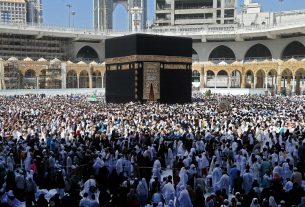NLC protests national Assembly
By Samuel Akinnuga
Anyone familiar with the nature of conversations on social media these days would understand where I’m coming from with the choice of this topic. For those who do not, I will give a little background. In one of those last courtesy visits to the villa, then president-elect Bola Tinubu made a remark that continues to generate some buzz.
He said: “Let the poor breathe; don’t suffocate them. We have that responsibility.” The statement, in a way, came across as the usual we-will-do-it-differently kind that most politicians around here make but with a somewhat more passionate tone.
I think the statement was profound; an indication of his commitment to pursue an economic agenda that would benefit the most vulnerable in society. Interestingly, this does not appear to have caught the fancy of comic content creators. Many went to work to create their own ‘let-the-poor-breathe’ videos and memes. I’ve seen quite a few really funny ones, and it appears that those creative materials popularised the president’s statement even more. The statement would remain a classic for its spirited significance, but the social media ‘streets’ would not also forget its comic value. I digress.
In various reviews of the president’s first month in office, the focus was largely on developments on the administrative, political and economic fronts. These assessments are not unusual. They generally follow the popular tradition of measuring progress over time for a new administration. For a country that should ideally be in a hurry, the assessments enable the hopeful populace to paint a picture of where they could be headed with the first major steps of the new administration.
President Tinubu’s first month was quite eventful: the removal of fuel subsidy, the floating of the Naira; the suspension of some senior government appointees; the appointment of special advisers; the appointment of new service chiefs; the signing of the Student Loan Bill, and so on. There has been a lot to talk about.
In my opinion, the buzz the new administration is getting is particularly significant against the backdrop of indecision and ineptitude that characterised the last administration. The new situation is a marked departure from what Nigerians were used to in those years. It says something different: the new sheriff can take some seemingly big decisions, and swiftly, too.
But ‘big’ decisions have great consequences, particularly for the vulnerable in society. In his recent remarks, the president has also tried to show understanding about the temporary discomfort that some of his decisions would bring about. He told the nation in his maiden Democracy Day address: “I feel your pains”.
That disposition is welcomed. Leaders are expected to empathise with their people; acknowledge the sacrifices which they may be required to make from time to time for more enduring gains. Elsewhere, both the leaders and citizens make these sacrifices in the interest of the country. Not here.
When President Tinubu made the statement I referenced earlier, it was a confirmation of this very fact: that the poor, who make up more than 60% of our population, are not ‘breathing’ and they have been suffocated for too long in this country. Across the country, it is clear that more and more of our countrymen are living in extreme privations. This is a depressing trend the government must be committed to reversing.
In the interim, it is apt to ask: what will the poor breathe? I think we can start with firm assurances; a guarantee on the part of the government that their sacrifices this time around would not be in vain; that the sacrificing would not be one-way; that the government would also shed some weight to reflect our current socio-economic condition. In this respect, the government has some serious convincing to do.
It can begin with a drastic reduction in the cost of governance and the elimination of redundant administrative bottlenecks. Low-hanging fruits. To make any significant impact, these assurances need to be seen because Nigerians come with some experience in these matters. Ours is a place where the people trust the government more to break promises than to keep them. And so, the cumulative impacts of all the promise-and-fail over the years is what has left us with a country we can hardly recognise.
The other ‘big’ decisions in the days ahead would likely cause more disruptions and these disruptions would likely have a more excruciating impact on the ‘poor’. For the most part, they are sceptical about any eldorado the government may promise.
Most are simply preoccupied with getting by today. The reality daily: a meal that is both inadequate in quantity and quality; covering more miles on foot to save transport costs; looking up to God for a miracle when they fall ill; holding on to some hope that they will get back to their families in one piece after the day’s work.
In a broader sense, we are not just speaking of the 133 million of us reported to be living in multidimensional poverty (In any case, the numbers are likely higher as a result of some recent policy decisions). There are more on the roll call: from the average professional who is flat the next week after payday to the businesses crippled by heavy tax burdens. I’m sure many readers get the point I try to make here.
As we look to the days ahead, more and more questions will be asked of this administration. I look forward to the details of the short-term palliative package being worked out to ‘let the poor breathe’ as well as the long-term plans to ensure they don’t suffocate on the journey to economic growth. Beyond the comic relief and the regular gbas gbos on social media, we can use this time to rethink the real specifics of the security and welfare (basic expectations) that the government primarily owes the citizens, wherever they may be.
Another priority must also be the strengthening of critical institutions that do not have to wait on the body language of Oga to do what is in our country’s interest. For now, I think the poor can breathe in the air of hope and optimism, strengthened by the quality of evidence seen. The burden of providing that evidence lies with those who asked for the job of bettering our collective lot in the first place.
May God bless our republic.
Akinnuga is a consultant on communications and public affairs. He wrote from Lagos.
The Guardian





